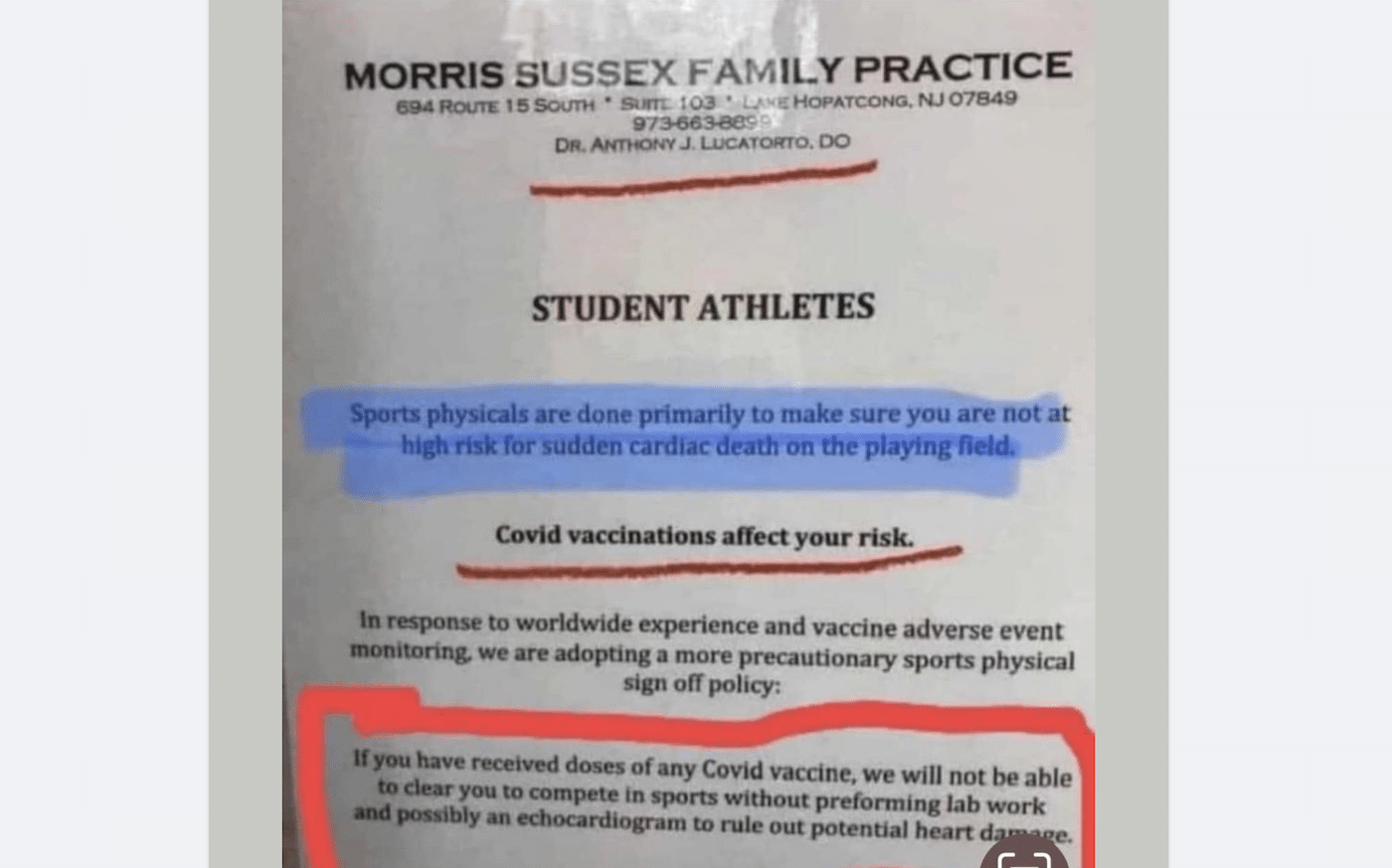- Health
COVID-19 itself can cause heart inflammation, in addition to other problems like long COVID; benefits of COVID-19 vaccines outweigh their risks
Key takeaway
Myocarditis is a condition in which the heart muscle becomes inflamed. Viral infections are a leading cause of myocarditis, and COVID-19 itself is known to cause heart inflammation. Data from clinical trials and ongoing monitoring of COVID-19 vaccination campaigns show that the benefits of the COVID-19 RNA vaccines outweigh their risks. Health authorities recommend that everyone aged 12 and above get vaccinated, because the risks posed by COVID-19, such as health complications and death, are greater than that posed by the vaccines.
Reviewed content

Verdict:
Claim:
More than half of myocarditis cases caused by COVID-19 vaccines occur in those aged between 12 and 34, yet this age group has a COVID-19 recovery rate of 99.99%
Verdict detail
Lacks context: RNA vaccines have been associated with a higher incidence of heart inflammation in adolescents and young adults. However, most cases so far recovered fully with rest and medical treatment. It’s important to keep in mind the fact that COVID-19 itself can cause heart inflammation, in addition to other complications like long COVID and death.
Full Claim
“Only 8.8% of all COVID-19 vaccines have been given to people between the ages of 12 and 24 - yet 52.5% of cases of vaccine-induced myocarditis and pericarditis have been in that age group. Recall, this same age group has a COVID-19 recovery rate of 99.99%.”
Review
The ongoing COVID-19 vaccination campaigns in many countries have been accompanied by close attention from health authorities to monitor vaccine safety. Indeed, thanks to monitoring by regulatory agencies, researchers have been able to detect and investigate even very rare events, such as blood clotting disorders now associated with viral vector COVID-19 vaccines, discussed in this Health Feedback review.
In April 2021, Israel, which launched the fastest COVID-19 vaccination campaign in the world thus far, reported tens of cases of myocarditis among more than five million people who were vaccinated. Myocarditis is a condition in which the heart muscle becomes inflamed. The condition can vary significantly in terms of severity. Some have myocarditis without realizing it, while others require medical care.
Researchers have identified several causes of myocarditis, such as viral infections, autoimmunity, and certain medications. In developed countries like the U.S., among known causes, viral infections are the leading cause of myocarditis. Most recover and go on to lead full lives, although some cases require treatment or even a heart transplant. A study published in 2016 reported that fewer than 1% of myocarditis patients required a heart transplant, while estimates from earlier studies ranged between 1 to 8%[1].
In May, both the U.S. Centers for Disease Control and Prevention (CDC) and the European Medicines Agency reported that they were reviewing cases of heart inflammation as well. Reuters later reported in early June that Israeli health authorities thought that there was a “probable link” between heart inflammation and the Pfizer-BioNTech COVID-19 vaccine, the most widely used vaccine in the country. These cases also more often occurred in males and after the second dose of the vaccine.
Because the data so far indicates that the majority of these cases occur in young people aged 30 and below, and because the COVID-19 mortality rate for this age group is low relative to older populations, some questioned whether COVID-19 vaccination in adolescents and young adults would be worth the risk of heart inflammation.
One example can be seen in physician Kelly Victory’s tweet, which was shared by the Facebook Page Earthley, which sells all-natural products. Another example is seen in this Facebook post by radio show host Wendy Bell. Bell, Victory, and the Facebook Page Earthley all previously shared misinformation about COVID-19.
This review aims to provide perspective on this issue by discussing myocarditis among vaccinated people and COVID-19 patients, and explain why vaccination would be less risky compared to getting COVID-19.
Heart inflammation in vaccinated youth associated with RNA vaccines; scientists are still investigating the cause
In her tweet, Victory claimed that “Only 8.8% of all COVID-19 vaccines have been given to people between the ages of 12 and 24 – yet 52.5% of cases of vaccine-induced myocarditis and pericarditis have been in that age group. Recall, this same age group has a COVID-19 recovery rate of 99.99%”.
She didn’t cite her source for the figures in her tweet, but the numbers are identical to those presented by the CDC COVID-19 Vaccine Task Force on 10 June 2021, specifically from the one shown below. These deal with preliminary cases of heart inflammation after two doses of RNA vaccines reported to VAERS up until 31 May 2021.

Because cases of heart inflammation have been occurring in people even before the COVID-19 vaccines became available, it is necessary to compare the rate of heart inflammation cases in vaccinated people with the baseline rate in the population. As shown above, the incidence of heart inflammation in those who received the RNA vaccines was higher than expected in people aged between 16 to 24 years old, but not for other age groups.
As the slide above shows, Victory’s figures are mostly accurate, although it is unclear where she derived the figure of “a COVID-19 recovery rate of 99.99%” nor did she define “recovery rate”.
Her claim that these cases are “vaccine-induced” is also unsupported by the evidence for the moment. VAERS reports only show that an adverse event occurred after vaccination. They aren’t evidence that the vaccine caused the adverse event. At the moment, scientists are still investigating whether there is a causal association between the RNA vaccines and heart inflammation, although they are investigating a possible link.
In the same presentation by the CDC COVID-19 Vaccine Task Force, there are also a lot of other data demonstrating the safety of RNA vaccines in youth that Victory left out, leaving readers with an incomplete and potentially misleading message about the vaccines’ safety.
For instance, Victory didn’t mention that of 285 case reports of myocarditis and pericarditis, 270 had been discharged, of which 91% went home. And among the 270 discharged, 81% fully recovered from symptoms. 19% had ongoing illness or unknown status. Therefore, based on what we know so far, the majority of heart inflammation cases recovered fully. The U.S. CDC website also states that “Most patients who received care responded well to medicine and rest and quickly felt better”. However, a caveat about these case reports is that the CDC is still reviewing more cases, and the final results may change our current outlook on the vaccines.
The presentation also showed that of more than 1,400 adverse events reported to the U.S. Vaccine Adverse Events Reporting System after receipt of the Pfizer-BioNTech COVID-19 vaccine in 12 to 15-year-olds, more than 96% were non-serious, with dizziness and nausea among the most common side effects. Note that more than 3.2 million vaccine doses had been administered to people in this age group.

COVID-19 itself can cause heart inflammation, in addition to other problems like long COVID
It’s true that adolescents and young adults are less likely to die compared to older age groups. Data as of 9 June 2021 show that of more than 580,000 deaths involving COVID-19 in the U.S., 314 occurred among those aged between 0 to 17 years old and more than 2,300 among those aged between 18 to 39 years old, according to the CDC’s provisional death counts.

Indeed, claims suggesting that COVID-19 is trivial commonly emphasize its relatively low mortality rate, particularly in the youth. This false dilemma masks the fact that there are more outcomes to COVID-19 besides complete recovery and death.
While the CDC report found that RNA vaccines are associated with a higher than expected incidence of heart inflammation in those aged between 16 to 24 years, it is important to remember that COVID-19 itself can cause heart inflammation as well, in addition to other health complications.
For instance, Multisystem Inflammatory Syndrome in Children, or MIS-C for short, is a condition that results in inflammation of multiple organs, such as the heart, lungs, kidney, and brain. Most cases of MIS-C appear to be linked to a history of SARS-CoV-2 infection. According to the CDC, 99% of cases tested positive for SARS CoV-2, while 1% had contact with someone with COVID-19. To date, there have been more than 4,000 cases of MIS-C and 36 deaths related to MIS-C.
In addition, children are also prone to developing long COVID like adults are. The CDC defines long COVID as “a range of symptoms that can last weeks or months after first being infected with the virus that causes COVID-19 or can appear weeks after infection. Long COVID can happen to anyone who has had COVID-19, even if the illness was mild, or they had no symptoms.”
The condition leads to symptoms that run the gamut from headaches, loss of smell or taste, fatigue, shortness of breath, and cognitive deficits. How often long COVID develops in children is unclear as there isn’t much data, although the U.K. Office of National Statistics estimated that between 13 to 15% of children with COVID-19 have symptoms lasting more than five weeks. Long COVID can have a detrimental effect on a person’s quality of life.
In a report by STAT News on long COVID in children, Audrey John, chief of pediatric infectious diseases at the Children’s Hospital of Philadelphia, highlighted:
“You can get Covid at 18 months of age […] Maybe you can’t tell us that you have a little brain fog. Maybe you can’t tell us that you just don’t feel great. But whether those kids grow like they’re supposed to, develop language like they’re supposed to, go on to be successful in school like they’re supposed to — we’re not going to learn for a long time.”
The CDC continues to recommend that everyone aged 12 years and older get the COVID-19 vaccines, “given the greater risk of other serious complications related to COVID-19, such as hospitalization, multisystem inflammatory syndrome in children (MIS-C), or death.”
On 12 June 2021, the American Heart Association (AHA) published a statement in which they recommended COVID-19 vaccination:
“We remain confident that the benefits of vaccination far exceed the very unusual risks. The risks of COVID-19 infection include its potentially fatal consequences and the potential long-term health effects that are still revealing themselves, including lingering consequences affecting the heart, brain, vascular system and other organs after infection.”
The CDC and AHA encourage people to be more aware of symptoms associated with myocarditis, such as chest pain, shortness of breath, and rapid or abnormal heart rhythms, and to seek care immediately if they experience any of these symptoms after receiving the COVID-19 vaccine.
REFERENCES
- 1 – ElAmm et al. (2016) Characteristics and Outcomes of Patients With Myocarditis Listed for Heart Transplantation. Circulation: Heart Failure.



